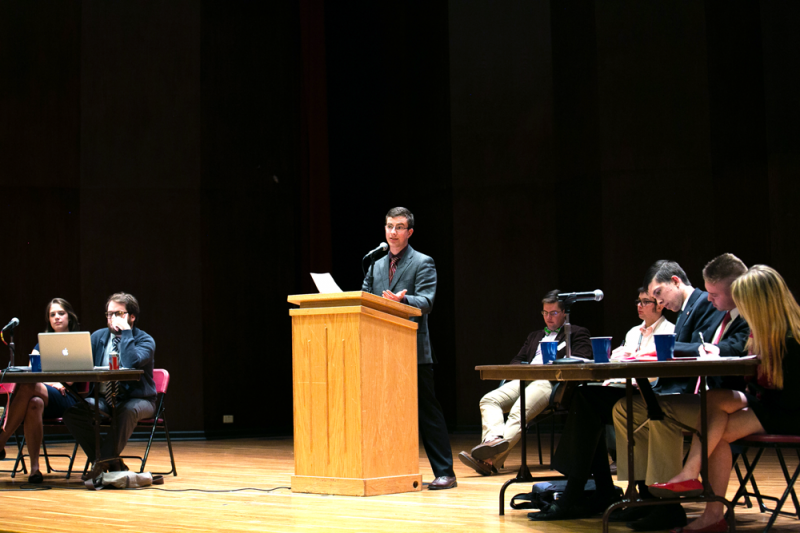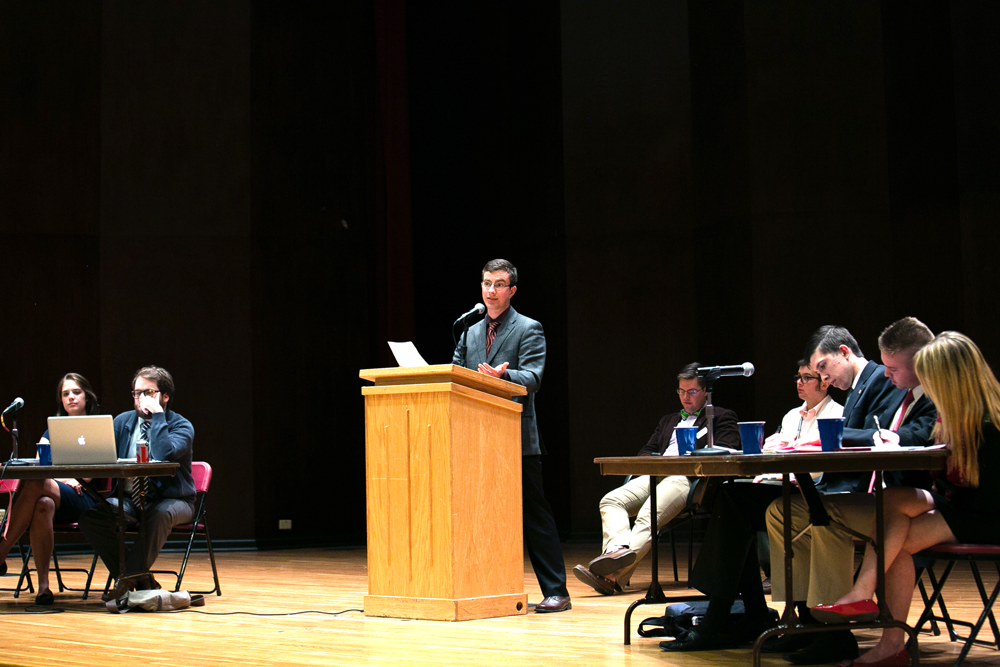
Last Tuesday, Feb. 18, the DU College Republicans and DU Democrats held their first formal debate since October 2012, with DU Debate Team participating for the first time.
The debate was held in the Davis Auditorium with approximately 40 people in attendance as three representatives from each side debated the Affordable Care Act (referred to by some as “Obamacare”), the minimum wage and long-term unemployment benefits.
Peter Cal, Roderick O’ Dorisio and Kelsey Betz argued for the Republican side, while Gabe Rusk, Chelsea Warren and Connor Everson represented the Democrat side.
Cal and O’Dorisio are members of College Republicans, while Warren and Everson are members of DU Democrats; Rusk and Betz argued on behalf of their respective sides and are members of the DU Debate Team. The debate was moderated by the presidents for the two clubs, Alex Johnson of the College Republicans and Trevor Fifer of the DU Democrats.
Each party was given the opportunity to present an opening argument for three minutes followed by eight minutes of cross-examination and a three-minute closing argument from each side.
The College Republicans won the coin toss and chose to speak first.
The opening question asked whether the Affordable Care Act has a positive effect on Americans. Democrats and Republicans were split on this issue.
O’Dorisio presented the Republican argument and stressed the idea of individual rights.
“Nothing is more personal than health,” he said.
He also accused Obamacare of “reducing the public from free citizens to cowards” and said it will make us a nation of takers.
Warren offered the Democratic rebuttal for the issue, in which she said the Affordable Care Act is “positive for America’s society” and “health care is bigger than just you, we have to take care of society as a whole and invest in our future.”
In closing, O’Dorisio compared Obamacare to old wine in new bottles. Warren rebutted by saying, “The Affordable Care Act is a damn good wine.”
The next question of the debate was whether or not the federal government should raise minimum wage.
Everson proposed a plan to raise the federal minimum wage to $10.10.
“Americans are earning less and working harder than at any other point in our nation’s history,” said Everson.
Cal responded with specific examples of how jobs were lost throughout history when governments raised minimum wage. He stated that the minimum wage should be chosen by local governments or municipalities because the cost of living differs for different places. For example, he said, the minimum wage in cities with a high cost of living, such as New York, should be higher than in cities where it is relatively low, such as Albuquerque.
“How exactly will companies finance a raise to $10.10 without having to cut jobs?” asked O’Dorisio during cross examination.
“History has shown a raise in minimum wage is followed by increases in consumer spending and an increase in revenue for those businesses,” responded Everson.
The final question of the debate addressed extending unemployment benefits past the current 99-week coverage period.
In her opening statement, Betz said extending the length in which unemployment benefits are offered would encourage unemployed people to delay looking for work.
“Raising benefit length would be dangerous because it would make people okay with being unemployed and relying on the government instead of out there applying for jobs and attempting to better themselves,” said Betz.
Rusk responded to Betz’s statement, saying citizens would use the proposed 150-week period in which unemployment benefits would apply to better themselves and get an education. He argued that without the extra weeks with benefits, unemployed people would re-enter the working world in entry-level positions that would not benefit the economy.
Overall, it seemed like the night belonged to the Democrats. The applause throughout the night seemed to lean left. Both sides defended their argument well but the team of Rusk, Warren and Everson had the upper hand when the night drew to a close.
The debate ended with both club presidents encouraging attendees to join their clubs. More information for each group can be found on OrgSync.











